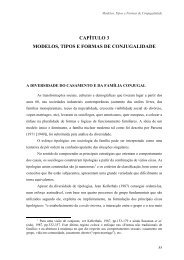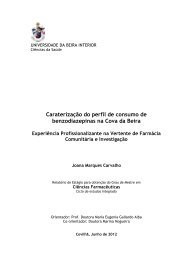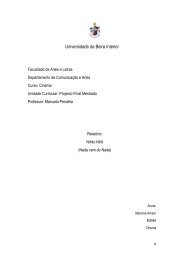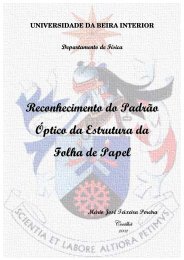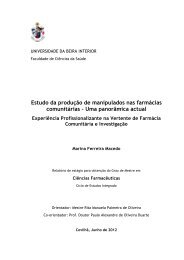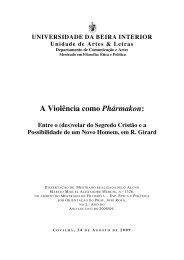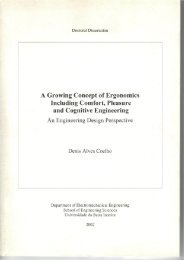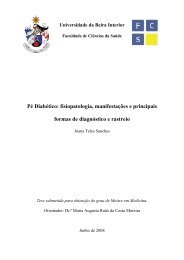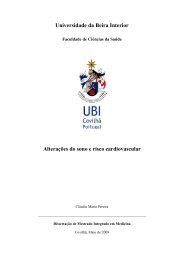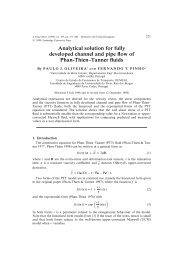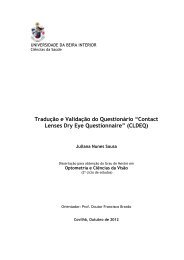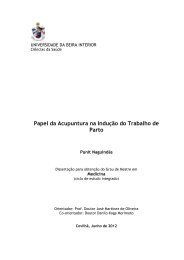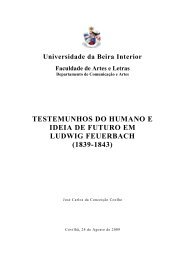- Page 1 and 2:
✐✐✐✐✐✐✐✐
- Page 3 and 4:
✐✐✐✐Anabela GradimComunica
- Page 5 and 6:
✐✐✐✐Conteúdo1 Introdução
- Page 7 and 8:
✐✐✐✐A Dimensão Comunicacio
- Page 9 and 10:
✐✐✐✐A Dimensão Comunicacio
- Page 11 and 12:
✐✐✐✐“My book is meant for
- Page 13 and 14:
✐✐✐✐“Mas para esta ilustr
- Page 15 and 16:
✐✐✐✐Capítulo 1Introdução
- Page 17 and 18:
✐✐✐✐A Dimensão Comunicacio
- Page 19 and 20:
✐✐✐✐A Dimensão Comunicacio
- Page 21 and 22:
✐✐✐✐A Dimensão Comunicacio
- Page 23 and 24:
✐✐✐✐A Dimensão Comunicacio
- Page 25 and 26:
✐✐✐✐A Dimensão Comunicacio
- Page 27 and 28:
✐✐✐✐A Dimensão Comunicacio
- Page 29 and 30:
✐✐✐✐A Dimensão Comunicacio
- Page 31 and 32:
✐✐✐✐A Dimensão Comunicacio
- Page 33 and 34:
✐✐✐✐A Dimensão Comunicacio
- Page 35 and 36:
✐✐✐✐A Dimensão Comunicacio
- Page 37 and 38:
✐✐✐✐Parte IPara uma fundame
- Page 39 and 40:
✐✐✐✐Capítulo 2Um novo para
- Page 41 and 42:
✐✐✐✐A Dimensão Comunicacio
- Page 43 and 44:
✐✐✐✐A Dimensão Comunicacio
- Page 45 and 46:
✐✐✐✐A Dimensão Comunicacio
- Page 47 and 48:
✐✐✐✐A Dimensão Comunicacio
- Page 49 and 50:
✐✐✐✐A Dimensão Comunicacio
- Page 51 and 52:
✐✐✐✐A Dimensão Comunicacio
- Page 53 and 54:
✐✐✐✐A Dimensão Comunicacio
- Page 55 and 56:
✐✐✐✐A Dimensão Comunicacio
- Page 57 and 58:
✐✐✐✐A Dimensão Comunicacio
- Page 59 and 60:
✐✐✐✐A Dimensão Comunicacio
- Page 61 and 62:
✐✐✐✐A Dimensão Comunicacio
- Page 63 and 64:
✐✐✐✐A Dimensão Comunicacio
- Page 65 and 66:
✐✐✐✐A Dimensão Comunicacio
- Page 67 and 68:
✐✐✐✐A Dimensão Comunicacio
- Page 69 and 70:
✐✐✐✐A Dimensão Comunicacio
- Page 71 and 72:
✐✐✐✐A Dimensão Comunicacio
- Page 73 and 74:
✐✐✐✐A Dimensão Comunicacio
- Page 75 and 76:
✐✐✐✐A Dimensão Comunicacio
- Page 77 and 78:
✐✐✐✐A Dimensão Comunicacio
- Page 79 and 80:
✐✐✐✐A Dimensão Comunicacio
- Page 81 and 82:
✐✐✐✐Capítulo 3Peirce: do p
- Page 83 and 84:
✐✐✐✐A Dimensão Comunicacio
- Page 85 and 86:
✐✐✐✐A Dimensão Comunicacio
- Page 87 and 88:
✐✐✐✐A Dimensão Comunicacio
- Page 89 and 90:
✐✐✐✐A Dimensão Comunicacio
- Page 91 and 92:
✐✐✐✐A Dimensão Comunicacio
- Page 93 and 94:
✐✐✐✐A Dimensão Comunicacio
- Page 95 and 96:
✐✐✐✐A Dimensão Comunicacio
- Page 97 and 98:
✐✐✐✐A Dimensão Comunicacio
- Page 99 and 100:
✐✐✐✐A Dimensão Comunicacio
- Page 101 and 102:
✐✐✐✐A Dimensão Comunicacio
- Page 103 and 104:
✐✐✐✐A Dimensão Comunicacio
- Page 105 and 106:
✐✐✐✐A Dimensão Comunicacio
- Page 107 and 108:
✐✐✐✐A Dimensão Comunicacio
- Page 109 and 110:
✐✐✐✐A Dimensão Comunicacio
- Page 111 and 112:
✐✐✐✐A Dimensão Comunicacio
- Page 113 and 114:
✐✐✐✐A Dimensão Comunicacio
- Page 115 and 116:
✐✐✐✐A Dimensão Comunicacio
- Page 117 and 118:
✐✐✐✐A Dimensão Comunicacio
- Page 119 and 120:
✐✐✐✐A Dimensão Comunicacio
- Page 121 and 122:
✐✐✐✐A Dimensão Comunicacio
- Page 123 and 124:
✐✐✐✐A Dimensão Comunicacio
- Page 125 and 126:
✐✐✐✐A Dimensão Comunicacio
- Page 127 and 128:
✐✐✐✐A Dimensão Comunicacio
- Page 129 and 130:
✐✐✐✐A Dimensão Comunicacio
- Page 131 and 132:
✐✐✐✐Capítulo 4A ética do
- Page 133 and 134:
✐✐✐✐A Dimensão Comunicacio
- Page 135 and 136:
✐✐✐✐A Dimensão Comunicacio
- Page 137 and 138:
✐✐✐✐A Dimensão Comunicacio
- Page 139 and 140:
✐✐✐✐A Dimensão Comunicacio
- Page 141 and 142:
✐✐✐✐A Dimensão Comunicacio
- Page 143 and 144:
✐✐✐✐A Dimensão Comunicacio
- Page 145 and 146:
✐✐✐✐A Dimensão Comunicacio
- Page 147 and 148:
✐✐✐✐A Dimensão Comunicacio
- Page 149 and 150:
✐✐✐✐A Dimensão Comunicacio
- Page 151 and 152:
✐✐✐✐A Dimensão Comunicacio
- Page 153 and 154:
✐✐✐✐A Dimensão Comunicacio
- Page 155 and 156:
✐✐✐✐A Dimensão Comunicacio
- Page 157 and 158:
✐✐✐✐A Dimensão Comunicacio
- Page 159 and 160:
✐✐✐✐A Dimensão Comunicacio
- Page 161 and 162:
✐✐✐✐A Dimensão Comunicacio
- Page 163 and 164:
✐✐✐✐A Dimensão Comunicacio
- Page 165 and 166:
✐✐✐✐A Dimensão Comunicacio
- Page 167 and 168:
✐✐✐✐Parte IIArquitectónica
- Page 169 and 170:
✐✐✐✐Upon this first, and in
- Page 171 and 172:
✐✐✐✐Capítulo 5As categoria
- Page 173 and 174:
✐✐✐✐Arquitectónica e Metaf
- Page 175 and 176:
✐✐✐✐Arquitectónica e Metaf
- Page 177 and 178:
✐✐✐✐Arquitectónica e Metaf
- Page 179 and 180:
✐✐✐✐Arquitectónica e Metaf
- Page 181 and 182:
✐✐✐✐Arquitectónica e Metaf
- Page 183 and 184:
✐✐✐✐Arquitectónica e Metaf
- Page 185 and 186:
✐✐✐✐Arquitectónica e Metaf
- Page 187 and 188:
✐✐✐✐Arquitectónica e Metaf
- Page 189 and 190:
✐✐✐✐Capítulo 6A dedução
- Page 191 and 192:
✐✐✐✐Arquitectónica e Metaf
- Page 193 and 194:
✐✐✐✐Arquitectónica e Metaf
- Page 195 and 196:
✐✐✐✐Arquitectónica e Metaf
- Page 197 and 198:
✐✐✐✐Capítulo 7A caracteriz
- Page 199 and 200:
✐✐✐✐Arquitectónica e Metaf
- Page 201 and 202:
✐✐✐✐Arquitectónica e Metaf
- Page 203 and 204:
✐✐✐✐Arquitectónica e Metaf
- Page 205 and 206:
✐✐✐✐Arquitectónica e Metaf
- Page 207 and 208:
✐✐✐✐Arquitectónica e Metaf
- Page 209 and 210:
✐✐✐✐Arquitectónica e Metaf
- Page 211 and 212:
✐✐✐✐Arquitectónica e Metaf
- Page 213 and 214:
✐✐✐✐Arquitectónica e Metaf
- Page 215 and 216:
✐✐✐✐Arquitectónica e Metaf
- Page 217 and 218:
✐✐✐✐Arquitectónica e Metaf
- Page 219 and 220:
✐✐✐✐Arquitectónica e Metaf
- Page 221 and 222:
✐✐✐✐Arquitectónica e Metaf
- Page 223 and 224:
✐✐✐✐Arquitectónica e Metaf
- Page 225 and 226:
✐✐✐✐Arquitectónica e Metaf
- Page 227 and 228:
✐✐✐✐Capítulo 8Categorias e
- Page 229 and 230:
✐✐✐✐Arquitectónica e Metaf
- Page 231 and 232:
✐✐✐✐Arquitectónica e Metaf
- Page 233 and 234:
✐✐✐✐Arquitectónica e Metaf
- Page 235 and 236:
✐✐✐✐Arquitectónica e Metaf
- Page 237 and 238:
✐✐✐✐Arquitectónica e Metaf
- Page 239 and 240:
✐✐✐✐Arquitectónica e Metaf
- Page 241 and 242:
✐✐✐✐Arquitectónica e Metaf
- Page 243 and 244:
✐✐✐✐Arquitectónica e Metaf
- Page 245 and 246:
✐✐✐✐Arquitectónica e Metaf
- Page 247 and 248:
✐✐✐✐Capítulo 9Categorias e
- Page 249 and 250:
✐✐✐✐Arquitectónica e Metaf
- Page 251 and 252:
✐✐✐✐Arquitectónica e Metaf
- Page 253 and 254:
✐✐✐✐Arquitectónica e Metaf
- Page 255 and 256:
✐✐✐✐Arquitectónica e Metaf
- Page 257 and 258:
✐✐✐✐Arquitectónica e Metaf
- Page 259 and 260:
✐✐✐✐Arquitectónica e Metaf
- Page 261 and 262:
✐✐✐✐Arquitectónica e Metaf
- Page 263 and 264:
✐✐✐✐Arquitectónica e Metaf
- Page 265 and 266:
✐✐✐✐Arquitectónica e Metaf
- Page 267 and 268:
✐✐✐✐Arquitectónica e Metaf
- Page 269 and 270:
✐✐✐✐Arquitectónica e Metaf
- Page 271 and 272:
✐✐✐✐Arquitectónica e Metaf
- Page 273 and 274:
✐✐✐✐Arquitectónica e Metaf
- Page 275 and 276:
✐✐✐✐Arquitectónica e Metaf
- Page 277 and 278:
✐✐✐✐Arquitectónica e Metaf
- Page 279 and 280:
✐✐✐✐Arquitectónica e Metaf
- Page 281 and 282:
✐✐✐✐Capítulo 10A semiótic
- Page 283 and 284:
✐✐✐✐Arquitectónica e Metaf
- Page 285 and 286:
✐✐✐✐Arquitectónica e Metaf
- Page 287 and 288:
✐✐✐✐Arquitectónica e Metaf
- Page 289 and 290:
✐✐✐✐Arquitectónica e Metaf
- Page 291 and 292:
✐✐✐✐Arquitectónica e Metaf
- Page 293 and 294:
✐✐✐✐Arquitectónica e Metaf
- Page 295 and 296:
✐✐✐✐Arquitectónica e Metaf
- Page 297 and 298:
✐✐✐✐Arquitectónica e Metaf
- Page 299 and 300:
✐✐✐✐Arquitectónica e Metaf
- Page 301 and 302:
✐✐✐✐Arquitectónica e Metaf
- Page 303 and 304:
✐✐✐✐Arquitectónica e Metaf
- Page 305 and 306:
✐✐✐✐Arquitectónica e Metaf
- Page 307 and 308:
✐✐✐✐Arquitectónica e Metaf
- Page 309 and 310:
✐✐✐✐Arquitectónica e Metaf
- Page 311 and 312:
✐✐✐✐Arquitectónica e Metaf
- Page 313 and 314:
✐✐✐✐Arquitectónica e Metaf
- Page 315 and 316:
✐✐✐✐Arquitectónica e Metaf
- Page 317 and 318:
✐✐✐✐Arquitectónica e Metaf
- Page 319 and 320:
✐✐✐✐Arquitectónica e Metaf
- Page 321 and 322:
✐✐✐✐Arquitectónica e Metaf
- Page 323 and 324:
✐✐✐✐Arquitectónica e Metaf
- Page 325 and 326:
✐✐✐✐Arquitectónica e Metaf
- Page 327 and 328:
✐✐✐✐Arquitectónica e Metaf
- Page 329 and 330:
✐✐✐✐Arquitectónica e Metaf
- Page 331 and 332:
✐✐✐✐Arquitectónica e Metaf
- Page 333 and 334:
✐✐✐✐Arquitectónica e Metaf
- Page 335 and 336:
✐✐✐✐Arquitectónica e Metaf
- Page 337 and 338:
✐✐✐✐Arquitectónica e Metaf
- Page 339 and 340:
✐✐✐✐Arquitectónica e Metaf
- Page 341 and 342:
✐✐✐✐Arquitectónica e Metaf
- Page 343 and 344:
✐✐✐✐Arquitectónica e Metaf
- Page 345 and 346:
✐✐✐✐Capítulo 11O idealismo
- Page 347 and 348:
✐✐✐✐Arquitectónica e Metaf
- Page 349 and 350:
✐✐✐✐Arquitectónica e Metaf
- Page 351 and 352:
✐✐✐✐Arquitectónica e Metaf
- Page 353 and 354:
✐✐✐✐Arquitectónica e Metaf
- Page 355 and 356:
✐✐✐✐Arquitectónica e Metaf
- Page 357 and 358:
✐✐✐✐Arquitectónica e Metaf
- Page 359 and 360:
✐✐✐✐Capítulo 12Metafísica
- Page 361 and 362:
✐✐✐✐Arquitectónica e Metaf
- Page 363 and 364:
✐✐✐✐Arquitectónica e Metaf
- Page 365 and 366:
✐✐✐✐Arquitectónica e Metaf
- Page 367 and 368:
✐✐✐✐Arquitectónica e Metaf
- Page 369 and 370:
✐✐✐✐Arquitectónica e Metaf
- Page 371 and 372:
✐✐✐✐Arquitectónica e Metaf
- Page 373 and 374:
✐✐✐✐Arquitectónica e Metaf
- Page 375 and 376:
✐✐✐✐Arquitectónica e Metaf
- Page 377 and 378: ✐✐✐✐Arquitectónica e Metaf
- Page 379 and 380: ✐✐✐✐Arquitectónica e Metaf
- Page 381 and 382: ✐✐✐✐Arquitectónica e Metaf
- Page 383 and 384: ✐✐✐✐Arquitectónica e Metaf
- Page 385 and 386: ✐✐✐✐Parte IIIÉtica e heter
- Page 387 and 388: ✐✐✐✐“A man convinced agai
- Page 389 and 390: ✐✐✐✐Capítulo 13A dimensão
- Page 391 and 392: ✐✐✐✐Ética e heteronomia 37
- Page 393 and 394: ✐✐✐✐Ética e heteronomia 37
- Page 395 and 396: ✐✐✐✐Ética e heteronomia 38
- Page 397 and 398: ✐✐✐✐Ética e heteronomia 38
- Page 399 and 400: ✐✐✐✐Ética e heteronomia 38
- Page 401 and 402: ✐✐✐✐Ética e heteronomia 38
- Page 403 and 404: ✐✐✐✐Ética e heteronomia 38
- Page 405 and 406: ✐✐✐✐Capítulo 14As Ciência
- Page 407 and 408: ✐✐✐✐Ética e heteronomia 39
- Page 409 and 410: ✐✐✐✐Ética e heteronomia 39
- Page 411 and 412: ✐✐✐✐Ética e heteronomia 39
- Page 413 and 414: ✐✐✐✐Ética e heteronomia 39
- Page 415 and 416: ✐✐✐✐Ética e heteronomia 40
- Page 417 and 418: ✐✐✐✐Ética e heteronomia 40
- Page 419 and 420: ✐✐✐✐Capítulo 15Notas sobre
- Page 421 and 422: ✐✐✐✐Ética e heteronomia 40
- Page 423 and 424: ✐✐✐✐Ética e heteronomia 40
- Page 425 and 426: ✐✐✐✐Ética e heteronomia 41
- Page 427: ✐✐✐✐Ética e heteronomia 41
- Page 431 and 432: ✐✐✐✐Capítulo 16MacIntyre e
- Page 433 and 434: ✐✐✐✐Ética e heteronomia 41
- Page 435 and 436: ✐✐✐✐Ética e heteronomia 42
- Page 437 and 438: ✐✐✐✐Ética e heteronomia 42
- Page 439 and 440: ✐✐✐✐Ética e heteronomia 42
- Page 441 and 442: ✐✐✐✐Ética e heteronomia 42
- Page 443 and 444: ✐✐✐✐Ética e heteronomia 42
- Page 445 and 446: ✐✐✐✐Ética e heteronomia 43
- Page 447 and 448: ✐✐✐✐Ética e heteronomia 43
- Page 449 and 450: ✐✐✐✐Ética e heteronomia 43
- Page 451 and 452: ✐✐✐✐Ética e heteronomia 43
- Page 453 and 454: ✐✐✐✐Ética e heteronomia 43
- Page 455 and 456: ✐✐✐✐Capítulo 17Subsídios
- Page 457 and 458: ✐✐✐✐Ética e heteronomia 44
- Page 459 and 460: ✐✐✐✐Ética e heteronomia 44
- Page 461 and 462: ✐✐✐✐Ética e heteronomia 44
- Page 463 and 464: ✐✐✐✐Ética e heteronomia 44
- Page 465 and 466: ✐✐✐✐Ética e heteronomia 45
- Page 467 and 468: ✐✐✐✐Ética e heteronomia 45
- Page 469 and 470: ✐✐✐✐Ética e heteronomia 45
- Page 471 and 472: ✐✐✐✐Parte IVBibliografia457
- Page 473 and 474: ✐✐✐✐Capítulo 18Referência
- Page 475 and 476: ✐✐✐✐Bibliografia 46118.2 Pe
- Page 477 and 478: ✐✐✐✐Bibliografia 463Aristó
- Page 479 and 480:
✐✐✐✐Bibliografia 465Ducrot,
- Page 481 and 482:
✐✐✐✐Bibliografia 467Hume, D
- Page 483 and 484:
✐✐✐✐Bibliografia 469Morente
- Page 485 and 486:
✐✐✐✐Bibliografia 471Searle,
- Page 487 and 488:
✐✐✐✐Bibliografia 473Apel, K
- Page 489 and 490:
✐✐✐✐Bibliografia 475Unified
- Page 491 and 492:
✐✐✐✐Bibliografia 477Dipert,
- Page 493 and 494:
✐✐✐✐Bibliografia 479Haack,
- Page 495 and 496:
✐✐✐✐Bibliografia 481Kevelso
- Page 497 and 498:
✐✐✐✐Bibliografia 483Marty,
- Page 499 and 500:
✐✐✐✐Bibliografia 485Pape, H
- Page 501 and 502:
✐✐✐✐Bibliografia 487Santael
- Page 503 and 504:
✐✐✐✐Bibliografia 489Tiercel
- Page 505 and 506:
✐✐✐✐✐✐✐✐



